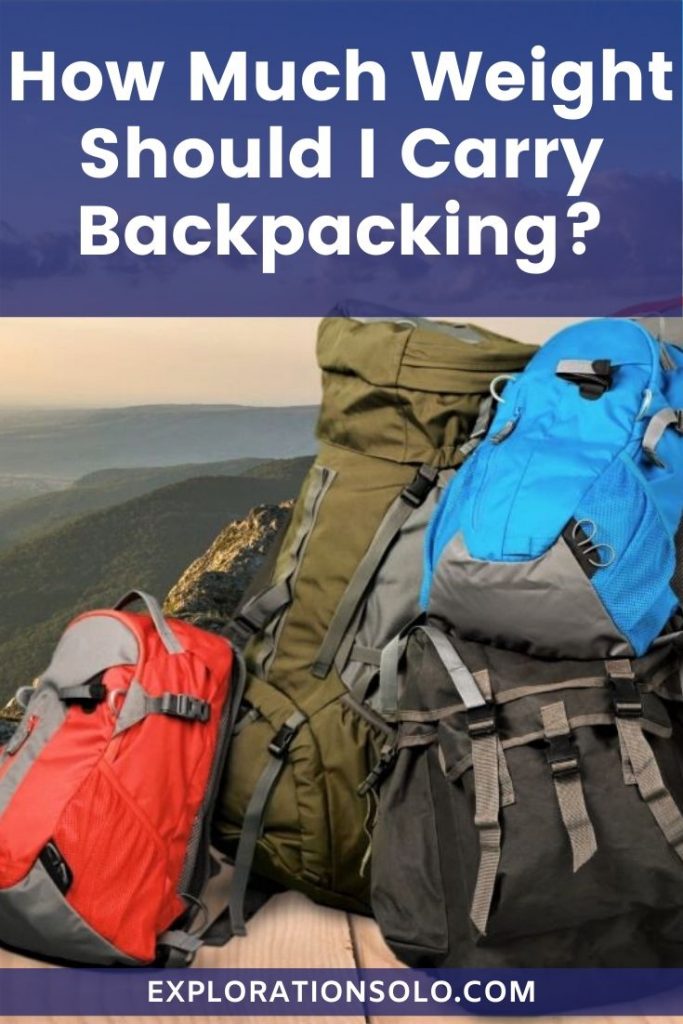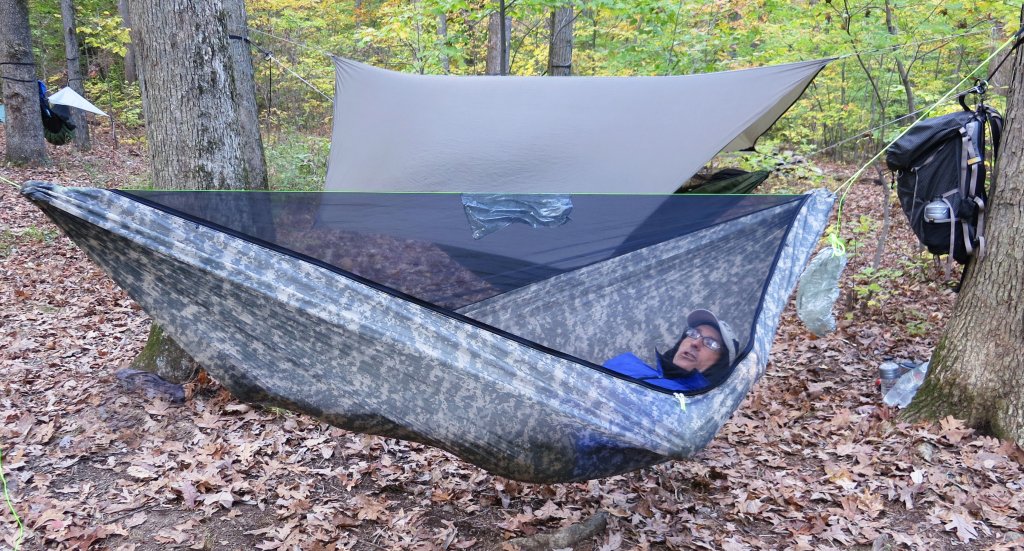- 8 Airplane Footrest Hammock!Travel comfortably - October 9, 2023
- top 7 Pool Float Water Hammock for a Relaxing Summer - October 9, 2023
- top 5 Space SaverSingle Hammock Stand Maximize Comfort and Space - October 9, 2023
The answer to this question depends on many factors, including your physical fitness, the terrain you’ll be hiking, the weather, and the length of your trip. A general rule of thumb is that your pack should weigh no more than one-third of your body weight.
So, if you weigh 150 pounds, your pack should weigh no more than 50 pounds.
Of course, there are exceptions to this rule. If you’re an experienced hiker in good shape, you may be able to carry a bit more weight. And if you’re hiking in flat terrain, you can probably get away with carrying a bit less.
But, in general, one-third of your body weight is a good guideline.
How To Pack The Right Amount Of Weight For Backpacking
How much weight should you carry backpacking? This is a question that often plagues backpackers, especially those new to the sport. The answer, unfortunately, is not cut and dry.
There are a lot of factors that go into deciding how much weight to carry, including the length of your trip, the terrain you’ll be hiking, the weather, and your own physical fitness. A general rule of thumb is that your backpack should weigh no more than one-third of your body weight. So, if you weigh 150 pounds, your backpack should weigh no more than 50 pounds.
Of course, there are always exceptions to the rule. If you’re hiking in extremely hilly or mountainous terrain, you may need to carry a bit more weight. And if you’re hiking in hot weather, you may want to carry less so you don’t overheat.
The best way to figure out how much weight you should carry is to experiment. Start with a light load on an easy hike. If you find that you’re comfortable and not struggling, then you can add a bit more weight on your next hike.
Slowly increase the amount of weight you carry until you find your sweet spot. What’s most important is that you listen to your body and don’t overdo it. Hiking is supposed to be fun, so don’t make it a chore by carrying too much weight.
Backpacking Weight Chart Kg
When it comes to backpacking, every ounce counts. That’s why it’s important to know what your gear weighs so you can pack accordingly. A backpacking weight chart can help you keep track of your gear and make sure you’re not carrying more than you need.
Here’s a look at some common items and their weights in kilograms. Item Weight in kg Sleeping bag 1.8-2.7 Tent 3.2-4.5 Backpack 2-3 Sleeping pad 0.9-1.4 Stove 0.4-0.6 Of course, these are just averages and your actual gear may weigh more or less.
Be sure to weigh your gear before you head out on your next backpacking trip!
Backpacking Weight Calculator
When it comes to backpacking, one of the most important things to consider is the weight of your backpack. After all, you will be carrying your backpack with you on your journey, so you want to make sure that it is not too heavy. There are a few different ways to calculate the weight of your backpack.
One way is to use a backpack weight calculator. There are a few different backpack weight calculators available online, so you can choose the one that best suits your needs. Another way to calculate the weight of your backpack is to use a backpacking weight formula.
This formula takes into account the weight of your backpack, the weight of your body, and the weight of your gear. This formula is a bit more complicated than the backpack weight calculator, but it can give you a more accurate estimate of the weight of your backpack. Once you have calculated the weight of your backpack, you can then start to pack your backpack.
Make sure to pack your backpack in a way that evenly distributes the weight. This will help to prevent your backpack from becoming too heavy and causing you problems on your journey.
Average Backpack Weight Kg
If you’re like most people, you probably don’t think too much about the weight of your backpack. But did you know that the average backpack weighs between 10 and 20 pounds? That’s a lot of weight to be carrying around on your back, day after day.
Of course, the weight of your backpack will vary depending on what you’re carrying in it. A backpack full of textbooks is going to weigh more than one that’s just carrying a few notebooks and a lunchbox. But even an empty backpack can weigh quite a bit.
The weight of your backpack can also vary depending on the material it’s made of. Backpacks made of heavier materials like leather or denim will weigh more than those made of lighter materials like nylon. So how much does the average backpack weigh?
It really depends on what you’re carrying in it and what it’s made of. But in general, you can expect most backpacks to weigh between 10 and 20 pounds.
4-Day Backpacking Trip Weight
Are you looking for a fun and challenging backpacking trip? Then a 4-day backpacking trip might be right for you! Here are a few things to consider when planning your trip.
First, you will need to determine how much weight you are able and willing to carry. This will largely be determined by your fitness level and the amount of gear you need or want to bring. If you are carrying a lot of gear, you may need to consider bringing a backpack with a frame to help distribute the weight more evenly.
Next, you will need to plan your route. Make sure to take into account the terrain you will be covering, the weather, and your own fitness level when planning your route. It is also important to leave an itinerary with someone you trust in case of emergencies.
Now that you have an idea of what you need to do to prepare for your trip, it’s time to start packing! Here is a list of essential items to bring on a 4 day backpacking trip: -Tent
-Sleeping bag -Stove and fuel -Cooking pot
-Food and snacks -Water filter or purification tablets -First aid kit
-Hiking boots -Clothes for all weather conditions Of course, you will also need to pack your own personal items, such as toiletries and a change of clothes. Be sure to pack light, but don’t forget anything essential. Now that you know what you need to do to plan and pack for a 4 day backpacking trip, all that’s left to do is get out there and enjoy the adventure!
Base Weight Calculator
Are you trying to lose weight, gain weight, or maintain your current weight? Regardless of your goal, it’s important to know your “base weight.” This is the minimum amount of weight you need to survive, and it’s determined by a variety of factors including your age, height, and gender.
There are a number of online calculators that can help you determine your base weight, but it’s also helpful to understand the formulas that these calculators use.For men, the base weight formula is:BW = 22 x (height in inches – 60) x (weight in pounds)
For women, the base weight formula is:BW = 22 x (height in inches – 60) x (weight in pounds) – 10%The “10%” in the women’s formula represents the average difference in body composition between men and women.
Women typically have a higher percentage of body fat than men, so their base weight is typically lower.Keep in mind that these formulas are averages, and your individual needs may be different. If you’re trying to lose weight, you’ll need to create a calorie deficit by eating less than your base weight.
And if you’re trying to gain weight, you’ll need to eat more than your base weight.The base weight calculator can be a helpful tool to determine how many calories you need to eat to reach your goals. But remember, it’s just a starting point.
You’ll need to use other methods to track your progress and make sure you’re on track to reach your goals.
Lightweight Backpacking Base Weight
One of the best ways to reduce your base weight is to go with a lightweight backpacking option. When you are looking at your base weight, you want to keep in mind the “big three” items which are your shelter, sleep system, and pack. These are the heaviest and bulkiest items in your pack, so if you can reduce the weight of these items, you will see a significant reduction in your base weight.
There are a lot of different ways to lighten your load when it comes to your shelter. One option is to ditch the tent and go with a tarp and groundsheet instead. This can save you a few pounds, but it’s not for everyone.
If you decide to go this route, make sure you know how to set up your tarp properly so you don’t get wet in a storm. Another option for your shelter is an ultralight tent. There are a lot of great options on the market these days that don’t weigh a lot, but still provide good protection from the elements.
If you go with an ultralight tent, make sure you are comfortable with the weight and size before you head out on your trip. When it comes to your sleep system, there are a few different ways to lighten the load. One option is to ditch the sleeping bag and go with a quilt instead.
Quilts are lighter-weight and easier to pack, and they can actually be more comfortable than a sleeping bag. Another option is to go with a lighter-weight sleeping bag. There are a lot of great options on the market that won’t weigh you down.
Finally, you want to take a look at your pack. There are a lot of great ultralight packs on the market that can save you a lot of weight. Make sure you choose a pack that fits your needs and that you are comfortable carrying.
Reducing your base weight will make your backpacking trip a lot more enjoyable. Lighten your load by choosing the right shelter, sleep system, and pack.
Average Backpack Weight for Appalachian Trail
The average backpack weight for Appalachian Trail thru-hikers is around 30 pounds (13.6 kg). This includes the weight of the backpack itself, as well as all the gear and supplies that are necessary for a successful thru-hike. The average hiker carries a lot of gear, including a tent, sleeping bag, stove, and food.
All of this gear is necessary for a successful thru-hike, but it can add up to a lot of weight. The good news is that there are ways to reduce the weight of your backpack. For example, you can choose to carry a lighter-weight tent or sleeping bag.
You can also choose to carry less food or dehydrate your food before you pack it. No matter how you choose to reduce the weight of your backpack, remember that the most important thing is to have fun and enjoy the experience.
Average Backpack Weight School
As the school year comes to an end, many parents are left wondering how much their child’s backpack should weigh. The American Academy of Pediatrics (AAP) recommends that a child’s backpack should not exceed 10% of their body weight. For example, if a child weighs 80 pounds, their backpack should not exceed 8 pounds.
There are a few things you can do to help ensure your child’s backpack is not too heavy. First, make sure that they are only carrying the essentials. If there are items that they can leave at home, have them do so.
Secondly, ensure that the backpack is properly fitted. A too-large or too-small backpack can cause back and shoulder pain. Finally, use all of the backpack’s compartments.
Distribute the weight evenly to avoid strain on any one area of the body. If your child’s backpack is too heavy, talk to their teacher. They may be able to help lighten the load by giving your child a locker or letting them leave some items at school.

Credit: momgoescamping.com
How Much Weight Should a Beginner Backpacker Carry?
When it comes to backpacking, the amount of weight you carry is extremely important. If you’re carrying too much, you’ll be exhausted and your trip will be much less enjoyable. On the other hand, if you’re carrying too little, you may not have all the supplies you need.
So, how much weight should a beginner backpacker carry?A general rule of thumb is that your backpack should weigh no more than 10-15% of your body weight. So, if you weigh 150 pounds, your backpack should weigh no more than 22.5 pounds.
Of course, this is just a general guideline and there are a few factors that can affect how much weight you can carry, such as your fitness level and the terrain you’ll be hiking.If you’re just starting out, it’s best to err on the side of carrying less weight. You can always add more weight if you find that you can handle it, but it’s much more difficult to take weight out of your backpack once you’ve already packed it.
Start with the essentials and then add in extras as you see fit.In general, the lighter your backpack, the better. So, if you’re just starting out, aim to keep your backpack as light as possible.
You’ll be glad you did when you’re out on the trail!
Are 40 Lbs Too Heavy for Backpacking?
No, 40 lbs is not too heavy for backpacking. While it is true that the average backpacker carries between 30-35 lbs, there are many factors that go into deciding how much weight to carry on a backpacking trip. The most important factors are the individual’s strength and fitness level, the distance they are planning to hike, and the terrain they will be hiking on.
If an individual is strong and fit, and is only planning on hiking for a short distance on relatively flat terrain, then they can probably carry a bit more weight without any issues. However, if the individual is not as strong or fit, or is planning on hiking for a longer distance or on more difficult terrain, then they might want to reconsider carrying as much weight.At the end of the day, it is really up to the individual to decide how much weight they are comfortable carrying.
If someone is carrying a bit more weight but is still able to hike without any problems, then there is no need to worry. However, if someone is carrying too much weight and is struggling to hike, then they might want to lighten their load.
How Much Weight Does the Average Backpacker Carry?
The average backpacker usually carries around 30-40 pounds. However, there are backpackers who carry much more weight and those who carry less. It all depends on the individual and their preferences.
Some backpackers choose to carry less weight by only bringing the essentials, while others choose to carry more weight so they can bring more items with them. No matter how much weight a backpacker carries, it is important to make sure the backpack is comfortable and fits well.
Is 35 Lbs Too Heavy for Backpacking?
It is often said that the ideal backpack weight for backpacking is between 20-30% of your body weight. For someone who weighs 140 lbs, this would be 28-42 lbs. So, is 35 lbs too heavy for backpacking?
The answer is that it depends. If you are carrying a lot of food and water, or if you are hiking in hot weather, you may want to keep your backpack weight closer to 20% of your body weight. On the other hand, if you are hiking in cold weather and don’t need to carry as much water, you may be able to carry a bit more weight.
The most important thing is to make sure that your backpack is comfortable and that you are able to carry it for long distances. If you are carrying a lot of weight, you may want to consider using a backpack with an internal frame to help distribute the weight more evenly. You may also want to consider using a hiking staff to help take some of the weight off of your back.
No matter how much weight you are carrying, it is always important to hike safely and take breaks when you need to. If you find that you are struggling to carry your backpack, it is always best to lighten the load rather than push yourself too hard.
Conclusion
How Much Weight Should I Carry Backpacking?The amount of weight you should carry backpacking depends on a variety of factors, including your fitness level, the terrain you’ll be hiking, the length of your trip, and the weather. A general rule of thumb is to carry no more than one-third of your body weight.
For example, if you weigh 150 pounds, you should carry no more than 50 pounds.Of course, there are exceptions to this rule. If you’re an experienced hiker who is in excellent shape, you may be able to carry more weight.
And if you’re hiking in flat terrain and good weather, you may be able to get away with carrying a bit more than one-third of your body weight.Ultimately, the best way to determine how much weight you should carry backpacking is to experiment. Start with a lighter load, and see how you feel after a few miles.
If you’re feeling good, you can add a bit more weight. But if you’re struggling, it’s time to lighten your load.








Pingback: 10-best-gps-apps-for-camping-and-hiking-in-2023
Pingback: Choosing The Right Backpack Size: How Many Liters Do You Need For A Day Hike?